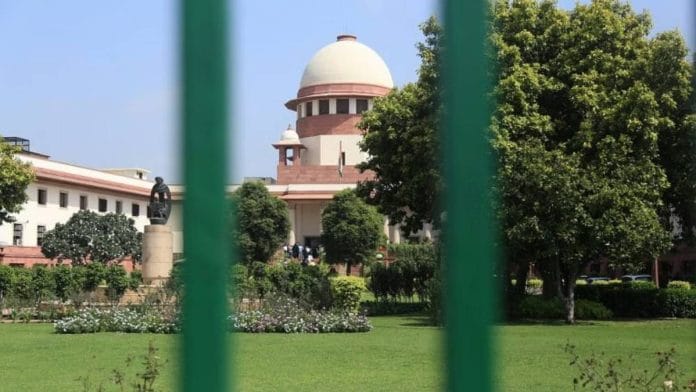New Delhi: Nine NDA-ruled states and one union territory (UT) have approached the Supreme Court with requests to become parties in the case relating to the marital rape exception in India’s new criminal code.
In separate intervention applications, the states and UT have asserted their right to be heard before the top court pronounces its judgement on the issue.
The SC is seized of a set of petitions challenging an exception to the offence of rape — sexual intercourse between a married couple. It protects a man from facing prosecution for rape in case the wife, who is not a minor, accuses him of having forced sex with her. This exception clause was part of Section 375 of the erstwhile Indian Penal Code (IPC) and continues to be an exception in the newly-enacted criminal code, Bharatiya Nyaya Sanhita (BNS).
The states that have moved intervention applications, seeking to become parties in the matter, are Gujarat, Madhya Pradesh, Uttarakhand, Assam, Rajasthan, Manipur, Uttar Pradesh, Chhattisgarh and Maharashtra. Jammu & Kashmir is the sole UT that has moved a similar plea.
Last week, a bench led by Chief Justice of India (CJI) D.Y. Chandrachud had heard the petitions and assured to hold a detailed hearing in the matter.
The set of petitions challenging the exception clause in the rape law include an appeal against the split verdict delivered in the matter by the Delhi High Court in May 2022.
The All India Democratic Women’s Association, which has moved the appeal, has also approached the top court separately challenging the retention of the marital rape exception in the new criminal code. This appeal too is part of the set of cases pending before the CJI’s court.
Besides, the court is seized of an appeal filed by a man from Karnataka that challenges the state high court’s approval to prosecute him for marital rape. Notably, the erstwhile BJP-led government of Karnataka has opposed the man’s appeal in the SC and favoured his prosecution.
Also Read: ‘Marital rape exception not absolute’ — Karnataka HC refuses to quash rape case against husband
Where states stand
The intervention applications filed by the states do not reveal the stand that they are likely to take in the course of arguments in the case. However, all states have asserted their jurisdiction over the issue arising in the petitions, which is the constitutionality of the marital rape exception.
They point out that according to the Constitution, states are an “accountable participant” in the criminal justice system for implementing rape-related legislation. The subject before the court, they submit, is included in the Constitution’s concurrent list (where both the Centre and state can legislate) and, hence, it clearly falls within the purview of the state legislature.
In its intervention application, Rajasthan has underlined the need for a holistic and just decision in the case. Filed by the state’s additional advocate general Shiv Mangal Sharma, the application says that since a decision in the matter will set a precedent for the entire country, it is crucial that the decision is “informed by the realities and challenges faced by different regions, leading to a more balanced and effective legal framework”.
The Uttarakhand government’s application, drawn by its counsel Vanshaja Shukla, talks about the state’s right to legislate and enforce laws framed in regard to the recognition of marriage within the state. Faced with the prospect of an order that may affect the state’s right on the subject, Uttarakhand has called it “necessary” for the court to hear it before pronouncing its verdict.
Gujarat too has described the issue pending before the court as one having “largescale societal implications” that would “seriously impact the interests of the state (of Gujarat)”.
And, since the court is looking into a subject that falls within the concurrent list, Gujarat submits that it would be in “public interest” that the state is heard before the SC takes a view on the marital rape exception.
(Edited by Nida Fatima Siddiqui)
Also Read: 82% women in India able to refuse sex to their husbands, finds govt’s family health survey






